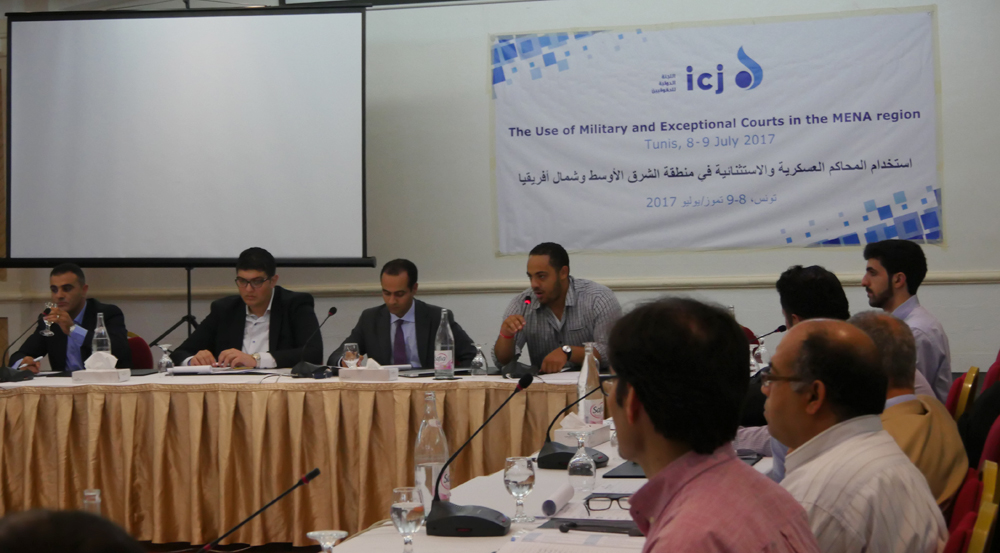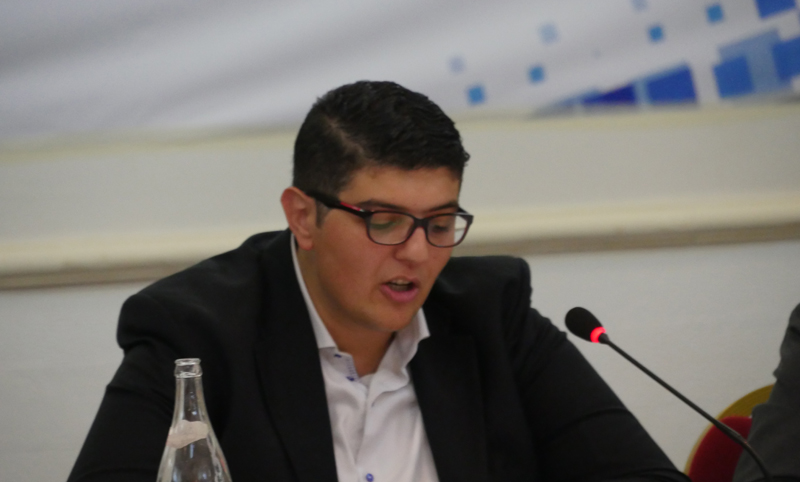
The Conference of Jurists on The Use of the Military and Exceptional Courts in The MENA region. TUNIS 8-9 July 2017
The Syrian Center for Media and Freedom of Expression (SCM) has been active for more than a decade in strengthening accountability and building for the transitional justice in Syria. In this context, the Center participated in the Conference of Jurists in/from North Africa and the Middle East on the Use of Military and Exceptional Courts, which had been organized by the International Commission of Jurists, and held in Tunisia on 8-9 July 2017.
Through its participation in this conference, SCM called for intensifying the efforts to restrict the work of the military courts, and exclude it from civil and political affairs, stressing that this kind of courts are still being used in restricting the opposition and for Impunity, in Syria and most of the Arab countries.
 “Military courts in the Middle East and North Africa have a wide mandate to decide the cases of opposition figures suspects in their opposition to the authorities, security and military personnel, including cases alleged responsibility of human rights violations!” said Mutassim al-Kilani, The representative of the Syrian Center for Media and Freedom of Expression (SCM) at the Conference of Jurists.
“Military courts in the Middle East and North Africa have a wide mandate to decide the cases of opposition figures suspects in their opposition to the authorities, security and military personnel, including cases alleged responsibility of human rights violations!” said Mutassim al-Kilani, The representative of the Syrian Center for Media and Freedom of Expression (SCM) at the Conference of Jurists.
“In these countries, there are serious concerns about the failure of these courts to comply with fair international trial standards, including denying detainees access to lawyers, and to privacy, severely restricting the detainees and their lawyers access to the documents, the charges and the evidence.”
All reports and studies conducted by international human rights organizations, notably the International Commission of Jurists, Amnesty International, Human Rights Watch and the International Federation for Human Rights, indicate that most of the rights and judicial guarantees recognized by international human rights instruments are subject to widespread violations in Syria, Especially in trials before military and field courts.
In this context, the Syrian Center for Media and Freedom of Expression (SCM) addressed its bitter experience, like the rest of the Syrians, with the military judiciary in Syria. The center’s president, Mazen Darwish, was arrested more than once. And was trialed by a Military Court in 2008.
In 2012, he was arrested again in addition to 12 other colleagues who were referred to the military court, after the SCM office in Damascus had been stormed and closed.
SCM also lost one of its members, the colleague Ayham Ghazul, who died under torture after his arrest in 2012.
In Syria, large numbers of political activists, journalists, and intellectuals were trialed before the military judiciary even before the revolution, which followed the doubling of the number of cases and field trials.
By the end of 2014, around 100,000 Syrian citizens had been referred to the military field court, according to human rights reports.
Around 5,000 Syrians got execution sentence in the same period.
“We at the Syrian Center for Media and Freedom of Expression (SCM), within the accountability and transitional justice program, work with our international and local partners so that criminals do not escape punishment in Syria, and dream of the day when we can put all war criminals in front of courts … in Syria.” Adds Al-Kilani.
At the end of this conference, the participants agreed to continue meeting and pressuring on the judicial systems in the region, to restrict the powers and jurisdiction of the military courts, believing that continuation of the work of these courts leads to a reduction of public freedoms, and increasing restrictions on personal freedoms. “




